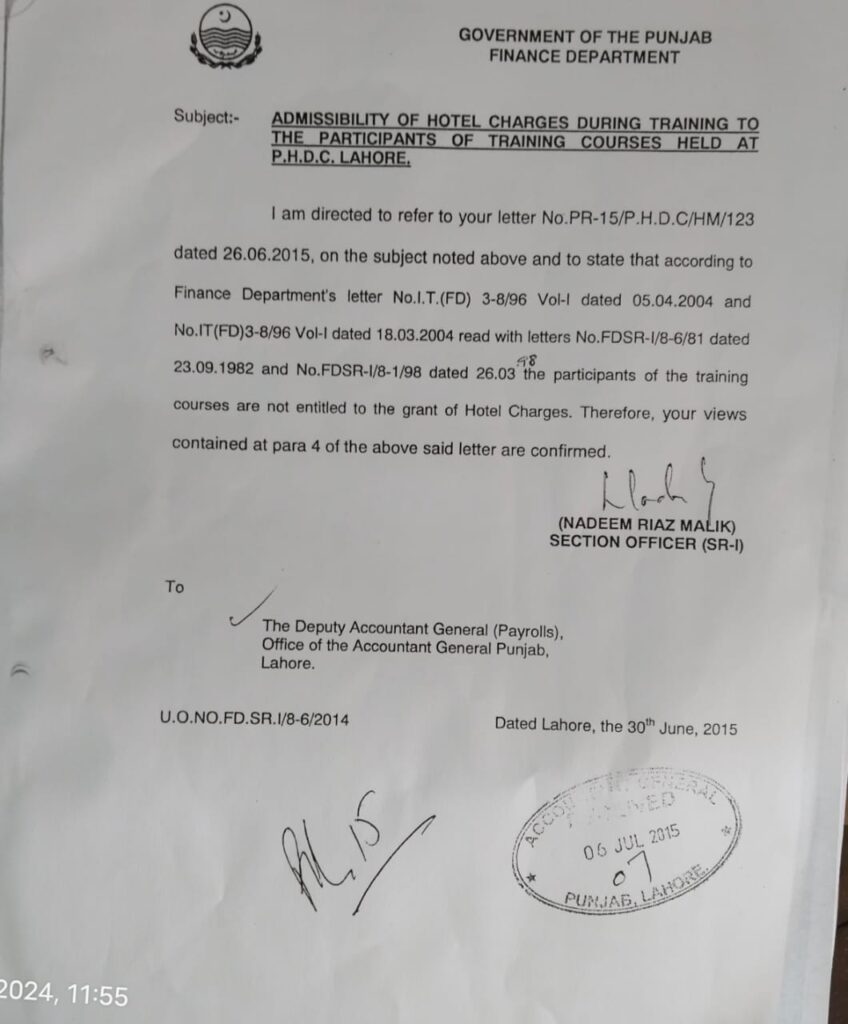
Admissibility of Hotel Charges During Training dt 30.06.2015
OFFICE MEMORANDUM
Subject: Admissibility of Hotel Charges During Training
ADMISSIBILITY OF HOTEL CHARGES DURING TRAINING TO THE PARTICIPANTS OF TRAINING COURSES HELD AT P.H.D.C. LAHORE,
I am directed to refer to your letter No.PR-15/P.H.D.C/HM/123
dated 26.06.2015, on the subject noted above and to state that according to Finance Department’s letter No.IT. (FD) 3-8/96 Vol-l dated 05.04.2004 and No.IT (FD)3-8/96 Vol-I dated 18.03.2004 read with letters No. FDSR-1/8-6/81 dated 23.09.1982 and No. FDSR-1/8-1/98 dated 26.03 the participants of the training courses are not entitled to the grant of Hotel Charges. Therefore, your views contained at para 4 of the above said letter are confirmed.
Admissibility of Hotel Charges for Training Participants
In response to your inquiry regarding the eligibility of hotel charges for participants attending training courses at P.H.D.C., Lahore, it is important to review the policies outlined by the Finance Department. These policies, detailed in several official communications, clearly indicate that hotel charges for such training participants are not admissible.
Policy Background
The central issue revolves around the rules set by the Finance Department, which are articulated in multiple documents:
- Finance Department’s Letter No.IT. (FD) 3-8/96 Vol-I dated 05.04.2004
- Finance Department’s Letter No.IT (FD)3-8/96 Vol-I dated 18.03.2004
- Finance Department’s Letter No. FDSR-1/8-6/81 dated 23.09.1982
- Finance Department’s Letter No. FDSR-1/8-1/98 dated 26.03
These letters collectively establish that participants of training courses are not eligible for hotel charges. This guideline has been consistently reinforced over time.
Detailed Explanation
- Financial Management and Guidelines: The Finance Department’s communications specify that the training budget does not include provisions for covering accommodation costs. This means that any expenses related to lodging incurred by participants during their stay for training purposes are not reimbursable. The rationale behind this policy is to maintain budgetary discipline and to ensure that funds are allocated appropriately.
- Consistency Across Communications: The uniformity of the rule across different dates and communications underlines its established status. The directives from 1982, 1998, and the early 2000s consistently support the policy that hotel expenses are not covered. This consistency indicates that the rule is firmly entrenched and has been uniformly applied over the years.
- Implications for Participants: For those attending training courses, this means they must bear their own accommodation expenses. It is essential for participants to plan accordingly and arrange for their lodging outside of the training budget. This policy aims to avoid additional financial burdens on the training organization and ensures that the allocated budget is spent solely on the training itself.
- Administrative Clarity: The confirmation of this policy ensures clarity for both the training organizers and participants. By adhering to these guidelines, the administrative process becomes streamlined, and there is less ambiguity about what expenses are covered. This helps in effective financial planning and management.
- Conclusion: Based on the directives provided by the Finance Department, hotel charges for participants attending training at P.H.D.C., Lahore are not admissible. This policy aligns with the broader objective of ensuring that training budgets are utilized for their intended purpose without extending to accommodation costs. The consistent reinforcement of this policy across various communications indicates its importance and the necessity for compliance.
In summary, the Finance Department’s guidelines are clear and unequivocal. Participants of training courses are responsible for their own lodging expenses. This policy ensures that financial resources are directed towards the training itself and not towards ancillary costs such as hotel stays. The confirmation of this policy aligns with established financial management practices and helps maintain clarity, consistency, and efficiency in the budgeting process. It also encourages the responsible of financial planning by participants and prevents unnecessary expenditure.

